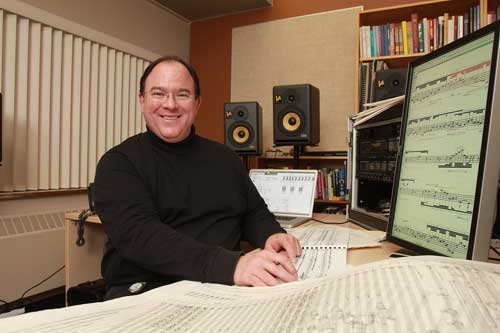Dr. Arlan Schultz is an assistant professor of music, composition and theory and the head of the composition area within the Department of Music in the Faculty of Fine Arts.
Schultz's music has been broadcast on Radio Canada, in France on CBC's sister network, and has been heard at performances in Canada, the United States, France, Germany, Austria and Hungary. He has also been commissioned by the National Arts Centre Orchestra, the McGill Concert Choir, the Stuttgart Wind Quintet with Canadian pianist Louise Besette, Hungarian violinist János Négyesy, Canadian pianist Sandra Brown, Ensemble Resonance, Calgary and New Works Calgary, among others.
In addition to his creative work, Schultz is active in several areas of research related to the field of composition. He is implementing software algorithms for real-time audio spatialization in live performance, and designing symbolic computational algorithms for computer-assisted composition and audio synthesis. As well, he is developing tools for electroacoustic composition in the form of audio-spatialization software and unique audio-sample databases.

What first piqued your interest in your research discipline?
At a young age, I was fascinated with the structure of music and the techniques involved in its composition. Although I was a pianist, the act of performance was somehow unsatisfying and I found myself increasingly involved in performative situations where improvisation and creativity were required. This engagement with creative music making is what directly led to my desire for more in-depth study of how music was put together.
Along this path, I discovered that, in addition to the traditional tools offered to a composer by historical (and newer) models for realizing a musical composition, there were significant technologies which could enhance the composer's expressive palette – such technologies include real-time spatialization techniques; interactive and computer mediated performance techniques; symbolic computational models; algorithmic composition; and new real-time techniques for audio synthesis.
How is your research applicable in "the real world"?
My current research is engaged with creating music and configuring it for transmission to an audience. When I consider the relevance of my research to the world at large (beyond the academic walls), I ask myself, "What role does music play in my daily life?"
Music is ubiquitous, but is it all meaningful? I view my research as a means for differentiating levels of meaning and for creating an aesthetic experience that goes beyond the background noise of daily living.
What is the greatest honour you have received in your career?
I have been fortunate to receive many grants and awards for my creative work, among them our current ACDI Grant from the Canada Council. However, the most important honour I have received in my career has been the great privilege of working with world-class performers on the production and performance of my work.
My wife, soprano Martha Renner, is a frequent collaborator on my vocal music and my more recent work has involved the inclusion of ritual Tibetan music. The Monks of the Drepung Gomang Monastery in South West India have honoured me by allowing the recording of their ritual music for study and inclusion in my creative work.
How important are students to your research endeavours?
To be a concert-music composer is to be a teacher – students are central to the survival of concert-music and to the continued advancement of, and experimentation with, musical discourse. The art of composition has always been passed on through apprenticeship models of teaching and my students play a central role in my creative life. My students have been actively involved with my musical productions and have been able to benefit from utilizing new technologies and hearing new ways to organize sound.
If you had unlimited funds, which areas of research would you invest?
I would invest in those forms of endeavour that keep us more fully human. Many have said that art fulfills this criterion, but in my view artistic endeavor informed by and combined with scientific research is among the most exciting fields for future research.
Each month, the Legend will present 5 Questions With . . . one of our researchers. For a look at the entire catalog of 5 Questions With . . . features, check out the Office of Research and Innovation Services website at www.uleth.ca/research/research_profiles. If you'd like to be profiled, contact Penny Pickles at pickpj@uleth.ca
This story first appeared in the December 2012 issue of the Legend. For a look at the entire issue in a flipbook format, follow this link.
